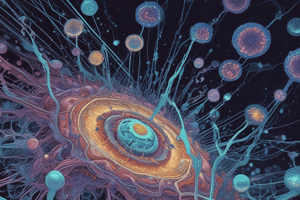Podcast
Questions and Answers
What significant conclusion did Rudolf Virchow make regarding cells?
What significant conclusion did Rudolf Virchow make regarding cells?
- Cells are made up of structures called organelles.
- Cells come from pre-existing cells. (correct)
- All cells are identical in function.
- Cells are the basic unit of life.
Which of the following statements is part of cell theory?
Which of the following statements is part of cell theory?
- Cells come from pre-existing cells. (correct)
- Energy flow occurs exclusively outside cells.
- Only plants are made up of cells.
- All cells have unique genetic material.
Which type of cell has a cell wall composed mostly of cellulose?
Which type of cell has a cell wall composed mostly of cellulose?
- Bacterial cell
- Fungal cell
- Plant cell (correct)
- Animal cell
What is the primary function of the cell membrane?
What is the primary function of the cell membrane?
Who is credited with the discovery of the first microscope?
Who is credited with the discovery of the first microscope?
Which scientist described 'animalcules' while observing pond water?
Which scientist described 'animalcules' while observing pond water?
In cell theory, what is stated about the composition of cells?
In cell theory, what is stated about the composition of cells?
What term is used to describe specialized structures within a cell?
What term is used to describe specialized structures within a cell?
What is the primary function of the nucleus in a cell?
What is the primary function of the nucleus in a cell?
Which structure is responsible for the production and assembly of ribosomes?
Which structure is responsible for the production and assembly of ribosomes?
What is the main function of mitochondria in the cell?
What is the main function of mitochondria in the cell?
Which type of endoplasmic reticulum is involved in detoxifying drugs and toxins?
Which type of endoplasmic reticulum is involved in detoxifying drugs and toxins?
What role does the Golgi body play in the cell?
What role does the Golgi body play in the cell?
Which organelle is specifically involved in the process of photosynthesis in plant cells?
Which organelle is specifically involved in the process of photosynthesis in plant cells?
What is the main function of lysosomes in animal cells?
What is the main function of lysosomes in animal cells?
What type of RNA is present in ribosomes?
What type of RNA is present in ribosomes?
Flashcards are hidden until you start studying
Study Notes
Cell Discovery Timeline
- 1590: Zacharias Janssen invented the first microscope, enabling the magnification of small objects.
- 1665: Robert Hooke observed cork under a microscope and named the structures he saw "cells," marking the basic unit of life.
- 1674: Anton van Leeuwenhoek discovered "animalcules" in pond water, pioneering microbiology.
- 1838: Matthias Schleiden concluded that all plants consist of cells.
- 1839: Theodor Schwann established that animals are also made of cells.
- 1855: Rudolf Virchow stated that cells arise from pre-existing cells, reaffirming the concept of cellular division.
Cell Theory
- All organisms are composed of cells.
- Cells are the fundamental units of structure and function in living entities.
- Cells originate only from other existing cells ("Omnis cellula e cellula").
- Genetic material is transferred from cell to cell during division.
- All cells exhibit similarities in structure and chemical makeup.
- Energy flow and biochemical processes occur within cells.
Cell Structures
- Organelles are specialized cell components functioning like "little organs."
Cell Membrane
- Thin, double-layered structure of proteins and fats.
- Separates cell contents from the external environment.
- Regulates material passage in and out of the cell.
Cell Wall (Plant Cell)
- Rigid structure composed mainly of cellulose.
- Provides protection, support, and structure to plant cells.
Nucleus
- Membrane-bound organelle discovered by Robert Brown in 1831.
- Stores the cell's DNA and regulates cellular activities.
- Controls ribosome and protein synthesis.
Nucleolus
- Spherical structure within the nucleus.
- Responsible for producing and assembling ribosomes.
Ribosome
- Composed of protein and RNA.
- Site of protein synthesis in the cell.
Mitochondrion
- Double-membraned, rod-shaped organelle with its own DNA.
- Produces ATP, the energy currency needed for cellular processes.
Endoplasmic Reticulum (Both)
-
Interconnected system of membranous sacs and tubules.
-
Rough ER:
- Ribosomes attached to surface.
- Modifies proteins and synthesizes phospholipids.
-
Smooth ER:
- Lacks ribosomes.
- Synthesizes carbohydrates, lipids, steroids; detoxifies drugs; stores calcium ions.
-
Golgi Body
- Series of flattened sac-like membranes.
- Sorts, tags, packages, and distributes lipids and proteins.
Lysosome (Animals)
- Spherical organelles with digestive enzymes.
- Break down nutrients, worn-out organelles, and aid in programmed cell death (apoptosis).
Chloroplast (Plants)
- Disc-shaped organelles containing chlorophyll.
- Primary site for photosynthesis, converting light energy into chemical energy.
Studying That Suits You
Use AI to generate personalized quizzes and flashcards to suit your learning preferences.




